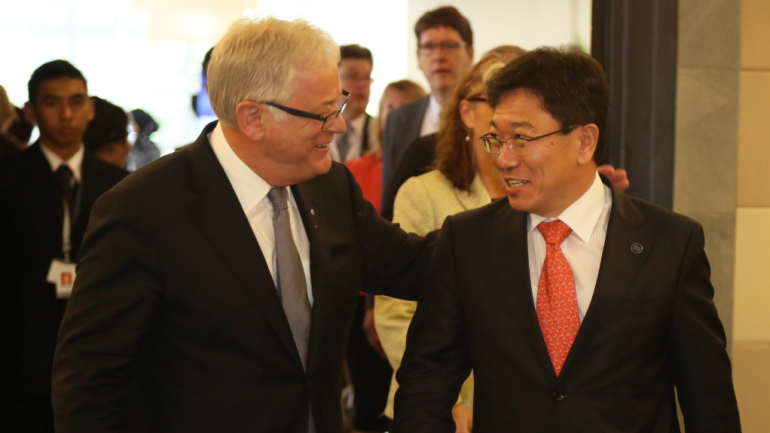Australia has just given away its FTA bargaining chip

Australian Trade Minister Andrew Robb and his Korean counterpart, HE Yoon Sang-jick, Korea Minister of Trade, Industry and Energy, on Thursday, Dec. 5, 2013. (AAP Image/DFAT)
Australia has offered South Koreans a special privilege that Canberra has only extended to two allies in the past. The foreign investment screening threshold will be lifted to over $1 billion under the Australia-South Korea free agreement.
This means that South Korean investors can buy Australian assets up to $1.078 billion (annually indexed) without the need to submit their investment proposals to the watchful eyes of the Foreign Investment Review Board.
The $1 billion threshold was first offered to the Americans under John Howard as part of the hard-fought Australia-US free trade agreement. The special treatment was extended to Kiwis as part of the Australia-New Zealand closer economic relations trade agreement.
This major concession to Seoul will have far reaching consequences for the current free trade negotiations with Beijing as well as for the future integrity of Australia’s foreign investment regime. The agreement with Seoul means we have just used up one of the few bargaining chips Australian negotiators have got in dealing with Beijing.
As a result of Australia’s liberal trade regime, the foreign investment screening threshold is one of the few carrots that Australian trade negotiators can offer to their counterparts. For years, Australia has unilaterally dismantled trade barriers starting with the dramatic 25 per cent cut to all tariffs on 28th July 1973 under Prime Minister Gough Whitlam.
Consequently, Australia has one of the lowest trade barriers. While it is good news for consumers who enjoy cheaper imports, it is a negative for trade negotiators who are engaged in difficult quid pro quo exchanges.
In the case of free trade negotiations with China, Canberra also made one major concession to the Chinese early in the negotiation process, granting Beijing the coveted ‘market economy status.’ This has reduced the already limited arsenal at Canberra’s disposal.
Now it is almost impossible not to grant the same foreign threshold concession to China without appearing discriminatory.
It was once defensible to say $1 billion foreign investment was only for special allies like the United States and New Zealand. But now that Canberra has extended the same offer to South Korea, it is difficult not to make the same concession to other parties.
And foreign investment just happens to be one of the two major hurdles holding up the protracted negotiations that started more than a decade ago. Frances Adamson, Canberra’s top envoy in Beijing said in 2012: “We are up against some issues on both sides which are difficult to resolve. On the Chinese side, investment and movement of natural person issues… would be difficult to resolve.”
For years, Beijing has demanded that Australia relax its foreign investment screening regime especially in relation to state-owned enterprises, which need to submit their investment proposals for vetting irrespective of their value.
Now Chinese negotiators can rightfully ask Canberra to extend the same offer that Korea just got to them. If the Abbott government really wants to conclude the much sought-after free trade agreement with China this year, it would be hard to turn it down.
A workable compromise might be that Canberra offers the $1 billion threshold to private Chinese companies while maintaining the current special screening regime for state-owned enterprises.
Chinese private bidders are fast becoming a new force to be reckoned with in the market, according to Corrs Chambers Westgarth’s new M&A review. The compromise can take advantage of this new trend in outbound Chinese investment as well as maintaining the check on state-owned enterprise.
However, a far bigger and more serious consequence of the Australia-South Korea free trade agreement is its impact on the integrity of Australia’s foreign investment screening regime, which has played an important role in maintaining public confidence about the benefits of foreign investment into Australia.
The $1 billion threshold is likely to become the new benchmark for all future free trade negotiations. It would be difficult for Canberra to continue a differentiated approach to investment thresholds in the future.















